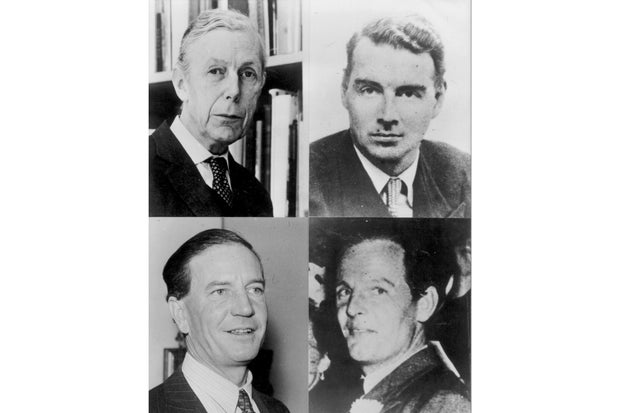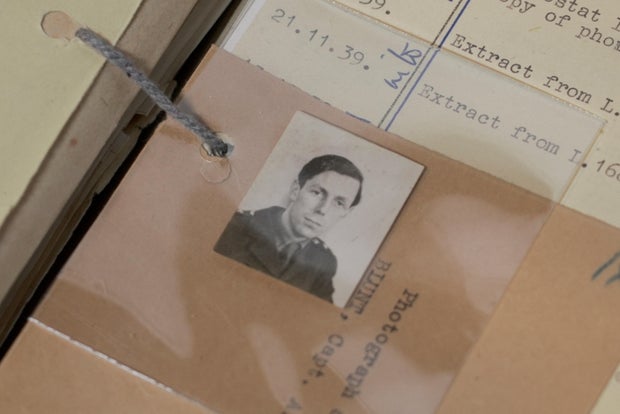Declassified files reveal new details about notorious British spies — and how Queen Elizabeth II was kept in the dark
queen elizabeth ii Newly declassified documents show that she was not told the details of her long-time art adviser’s double life as a Soviet spy because palace officials did not want to add to her concerns.
Britain’s National Archives on Tuesday released rare files from Britain’s intelligence agency MI5, including those about royal art historian Anthony Blunt. They shed new light on a 1930s spy ring linked to Cambridge University, whose members leaked secrets at the heart of British intelligence to the Soviets.
Blunt, who worked as the Queen’s picture surveyor at Buckingham Palace, was under suspicion for years until 1964 when he finally admitted that, as a senior MI5 official during World War II, he had passed secret messages to Soviet agents.
In a newly released document, an MI5 official noted that Blunt said he felt “deep relief” that the burden had been lifted off him. In return for the information he provided, Blunt was allowed to keep his job, knighthood, and social status—while the Queen was apparently kept in the dark.
In 1972, her private secretary Martin Charteris told MI5 chief Michael Hanley that “the Queen did not know and he did not see any advantage in telling her about it now; It only adds to her worries and there’s nothing he can do about it.”
/AP
When Blunt fell ill in 1973, the government decided to tell the Queen about it, fearing there would be a media uproar following Blunt’s death and that reporters could publish stories without fear of libel suits.
Charteris reported that “she took it all very calmly and was not surprised” and “remembered that he had been under suspicion as early as the early 1950s”. Historian Christopher Andrew said in MI5’s official history that the Queen had previously been told “generally” about Blunt.
queen elizabeth ii Died in 2022 96 years old.
In November 1979, British Prime Minister Margaret Thatcher publicly exposed Blunt’s identity as a spy in the House of Commons. He was eventually stripped of his knighthood but was never prosecuted and died in 1983 at the age of 75.
Documents held by Britain’s secret intelligence services are often kept secret for decades, but the agencies are gradually moving in a more open direction. Some of the newly released documents will be displayed in an exhibition titled MI5: Official Secrets at the National Archives in London later this year.
Two Cambridge spies, Donald Maclean and Guy Burgess, fled to Russia in 1951. The third, Kim Philby, continued to work for the foreign intelligence agency MI6 despite being under suspicion. As evidence of his duplicity mounted, in January 1963 he met his friend and MI6 colleague Nicholas Elliott in Beirut.
The declassified documents include Philby’s typed confession and transcripts of his discussions with Elliott.
/AP
Philby admitted in the letter that he had betrayed KGB officer Konstantin Volkov, who attempted to defect to the West in 1945, bringing with him details of spies within British intelligence, including Including Philby himself. Due to Philby’s intervention, Volkov was kidnapped in Istanbul, taken to Moscow and executed.
Elliott reported that Philby said that if he could live his life over, he might behave the same way.
“I did feel a huge loyalty to MI6,” Philby said, according to the transcript. “I was treated very, very well there and I made some really amazing friends there.” “But it was overwhelming. Inspiration comes from the other side.”
Philby told Elliott the choice he now faced was “between suicide and prosecution”. Instead, he fled to Moscow, where he died in 1988.
The Cambridge spies have inspired countless books, theater films and TV shows, including the 2023 series Spy Among Friends, starring Guy Pearce as Philby and Damian Lewis (Damian Lewis) as Elliott. Blunt starred in the 2019 drama The Crown, played by Samuel West.
Marisa Davidson/Reuters
Members of the Cambridge spy ring were viewed by their Soviet superiors as desperate drunks unable to keep secrets, according to documents released in 2014. According to the BBC.
One article described Burgess as someone who was “often under the influence of alcohol,” while another described Maclean as “not very good at keeping secrets,” the BBC reported. It added that he was “frequently drunk” and drank heavily.





